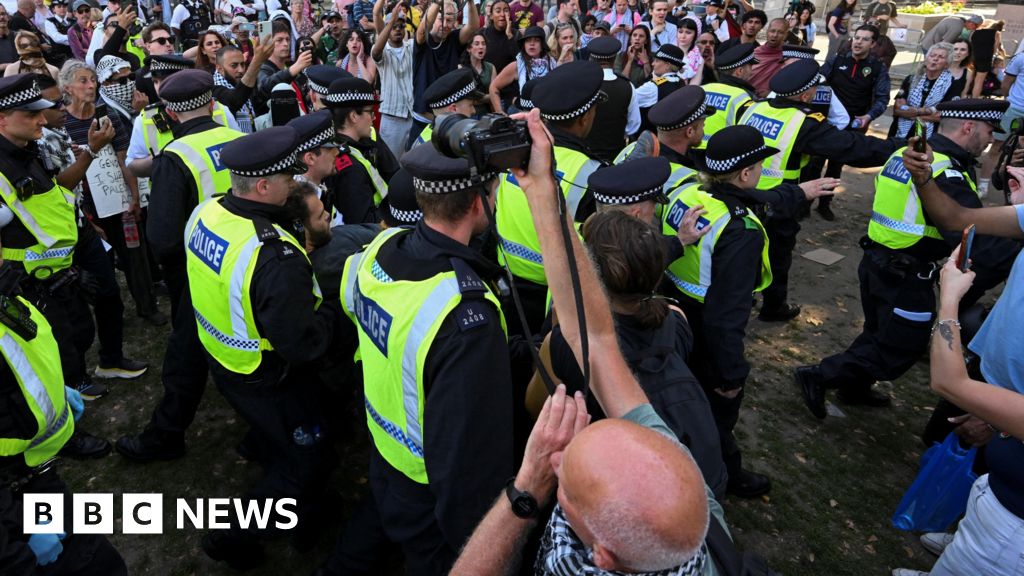Yvette Cooper has said that some supporters of Palestine Action “don’t know the full nature” of the group, following the mass arrest of more than 500 people at the weekend.
Defending the organisation’s proscription, she stressed it was “not a non-violent organisation”.
The home secretary said tens of thousands protested lawfully about the “horrendous events” in Gaza without involving Palestine Action, which was banned under terror legislation last month.
Palestine Action won permission to challenge the ban, with a hearing set for November, and Amnesty International described the arrests as “deeply concerning”.
The proscription made membership of or support for Palestine Action a criminal offence, punishable by up to 14 years in prison and happened after the group claimed responsibility for an estimated £7m of damage to jets at RAF Brize Norton.
On Saturday, hundreds of protesters simultaneously pulled out placards supporting Palestine Action outside Parliament at 13:00 BST. In all, 532 people were arrested.
The home secretary stood by her decision to proscribe Palestine Action, which she said had been “involved in violent attacks” and “major criminal damage against national security infrastructure”.
She told the BBC: “There may be people who are objecting to proscription who don’t know the full nature of this organisation, because of court restrictions on reporting while serious prosecutions are under way.
“But it’s really important that no-one is in any doubt that this is not a non-violent organisation.”
Cooper added there had been “clear security assessments and advice” ahead of the ban.
The human rights charity Amnesty International’s chief executive Sacha Deshmukh suggested the response to the protest was disproportionate.
He said: “We have long criticised UK terrorism law for being excessively broad and vaguely worded and a threat to freedom of expression. These arrests demonstrate that our concerns were justified.”
Asked whether there was any reconsideration of the decision to proscribe Palestine Action, the prime minister’s official spokesman said it was based on strong security advice.
He told journalists Palestine Action had been considered to have committed three separate terrorism acts by the Joint Terrorism Analysis Centre, although he declined to say what these were.
“Palestine Action was proscribed based on strong security advice – following serious attacks the group has committed involving violence, significant injuries and extensive criminal damage,” he said, adding: “Whilst many people may not yet know the reality of the organisation – those assessments are very clear.”
The spokesman said the police had carried out their duties “without fear or favour”, which he said was “a foundational principle of policing by consent”.
King Charles III’s former adviser, Sir Jonathon Porritt, was among those arrested for attending the protest on Saturday.
Challenged over his support for the proscribed group on BBC Newsnight, he said he had come to “the conclusion that the UK government is now incontrovertibly complicit” in “genocide”.
“Palestine Action is the most effective organisation in highlighting the government’s complicity,” he added.
The environmentalist and former Friends of the Earth director cited the government’s “continuing sale of arms to Israel” and its “reckless refusal to follow guidance from the International Court of Justice to seek to prevent genocide in countries like Gaza” as reasons.
Asked by Victoria Derbyshire about whether he thought people should be allowed to pick and choose which laws are followed or ignored, Sir Jonathon pointed to “a long and honourable record of people deciding for themselves on the basis of their conscience which laws uphold the values to which they subscribe”.
He said: “532 people were there in Parliament Square on Saturday absolutely determined to demonstrate what the government has done is not consistent with their sense of justice and fairness here in the UK.”
Prime Minister Sir Keir Starmer has warned Israel he will recognise a Palestinian state in September unless Israel takes “substantive steps to end the appalling situation in Gaza”.
The move has been strongly criticised by Israel who said it “rewards Hamas’s monstrous terrorism”.
The UN’s humanitarian agency said on Friday that the amount of aid entering Gaza continues to be “far below the minimum required to meet people’s immense needs”, and last month, UN-backed global food security experts warned the “worst-case scenario of famine is currently playing out”.
Israel has continued to deny there is starvation in Gaza and has accused UN agencies of not picking up aid at the borders and delivering it.
Israel launched its offensive in response to the Hamas-led attack on southern Israel on 7 October 2023, in which about 1,200 people were killed and 251 others were taken hostage.
Since then, 61,430 people have been killed in Gaza as a result of Israel’s military campaign, according to the health ministry.
